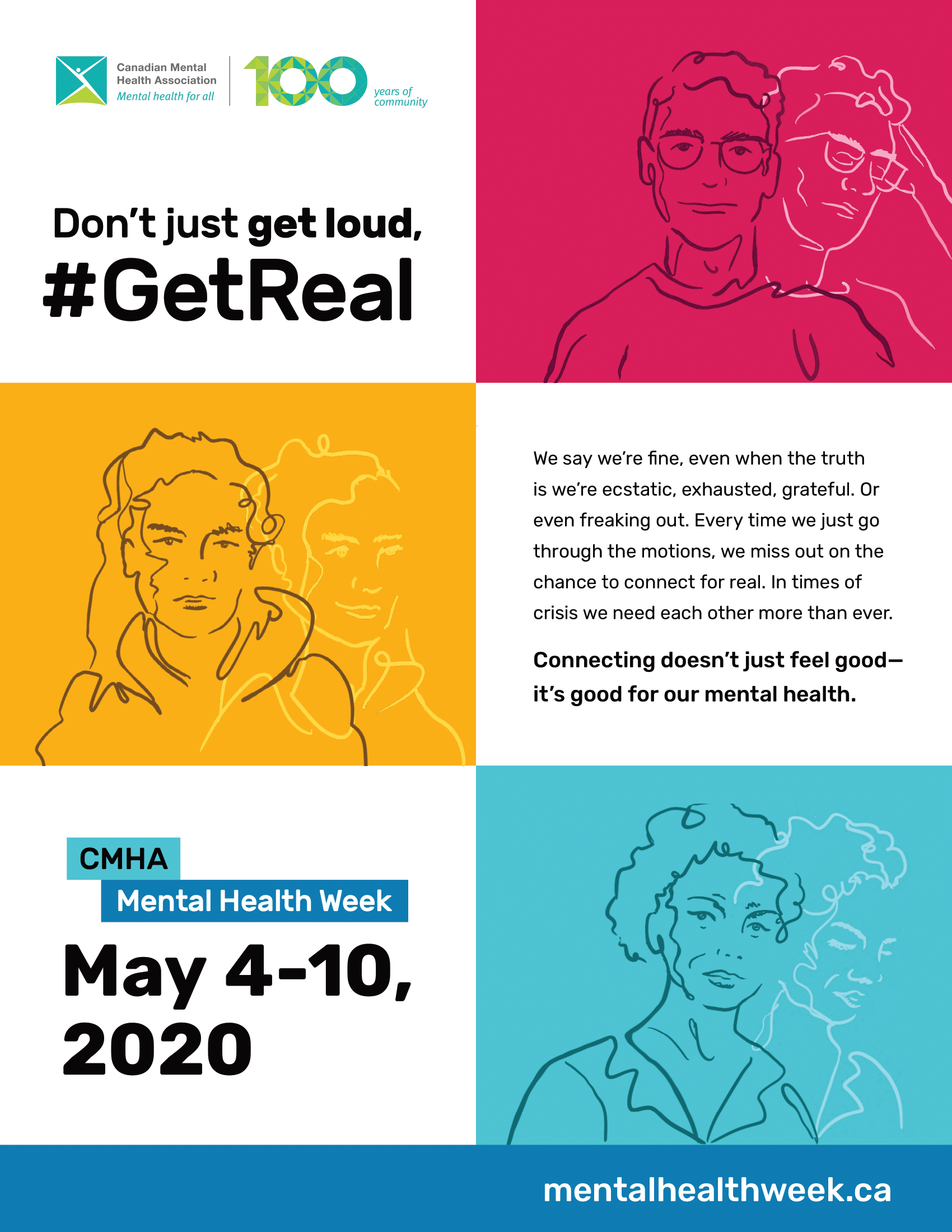Menu Close
Canadians are anxious and crave real connection, but say they’re doing “fine”
May 4, 2020
FOR IMMEDIATE RELEASE

FOR IMMEDIATE RELEASE
For Mental Health Week, the Canadian Mental Health Association – Simcoe County promotes social connection to protect mental health in these difficult times
Barrie (Ontario) May 4, 2020 – Most Canadians rely on shortcuts to describe their emotional state—even during the COVID-19 pandemic. According to new data released today by the Canadian Mental Health Association (CMHA) in partnership with Maru/Matchbox, 77 per cent of those asked “how are you?” rely on “I’m fine, thanks” to express how they’re doing, despite the fact that Canadians are feeling more negative emotions than positive ones these days (53% negative vs. 47% positive). The data were released to mark Canada’s 69th annual Mental Health Week, which runs May 4-10, 2020.
Despite a pandemic-driven growth in video-conferencing and social media usage, Canadians are feeling more isolated than ever (up 8 points from 39% to 47% in less than one month) and crave real, meaningful connections. In fact, two-thirds of Canadians (66%) report they would like to experience more meaningful social interactions in their daily life.
“Most Canadians want more social connection, yet they’re reluctant to have the kind of honest, open conversations that build the connection they crave,” says Margaret Eaton, national CEO of CMHA. “In our society, it’s a cultural norm to ask people how they’re doing, but not to expect, nor provide, a truthful answer. This Mental Health Week, it’s time to get real about how we feel. It’s clear we need each other more than ever.”
Prior to the global pandemic, loneliness was already a major public health concern. People with weak or few social connections are at increased risk for anxiety, depression, anti-social behaviour and suicide.[1] And a lack of strong relationships has the same negative impact on life expectancy as smoking 15 cigarettes a day.[2]
Due to physical distancing measures, people are isolated in their homes, missing family events and in-person activities and it appears they are feeling it. Almost half of Canadians are feeling anxious (47%), and only eight per cent are feeling happy. As we face social distancing measures, it is important to note that people do not need to be close to feel close.
Strong social networks lead to better self-esteem, coping mechanisms and a sense of well-being, and reduce depression and distress by providing emotional support, companionship and opportunities for meaningful social engagement.[3]
The focus of this year’s Mental Health Week is to promote social connection and the role it plays in good mental health. To get involved, you can:
- Learn more about your mental health and how to feel close even when we can’t be at ca/yourmentalhealth
- Share your support on social media by downloading a toolkit at ca/toolkit and using hashtags #GetReal #MentalHealthWeek and #TogetherApart
- Donate to support CMHA mental health programs and services at https://starttalking.ca/donate/
- If you or someone you love is struggling, please contact www.https://cmhastarttalking.ca or 705-726-5033 to find out about virtual and phone-based support services there to help you. Or, visit the Government of Canada’s Wellness Together portal. If you are in crisis, please call 1-833-456-4566 toll free in Canada (1-866-277-3553 in Quebec).
Mental Health Week was introduced by CMHA in 1951 and has since become a Canadian tradition. To learn more, please visit www.mentalhealthweek.ca
About the Data
CMHA partnered with Maru/Matchbox to conduct an online survey among a total of 1,507 Canadian adults on April 15, 2020. A probability sample of this size would have a margin of error of +/- 2.5%, nineteen times out of twenty. The sample was weighted to reflect the Canadian adult population according to the most recent Census data. Additional data was taken from Maru’s ongoing, near-daily FEEL, BEHAVE, THINK COVID-19 tracking study. For more information, please go to www.marureports.com/coronavirus
About the Canadian Mental Health Association
Founded in 1918, the Canadian Mental Health Association (CMHA) is the most established, most extensive community mental health organization in Canada. Through a presence in more than 330 communities across every province and one territory, CMHA provides advocacy, programs and resources that help to prevent mental health problems and illnesses, support recovery and resilience, and enable all Canadians to flourish and thrive. For more information, visit www.cmha.ca
-30-
For more information, or to arrange an interview, please contact:
Valerie Grdisa, Chief Executive Officer CMHA-Simcoe County 705-726-5033 Ext. 431 vgrdisa@cmhastarttalking.ca Aleta Armstrong Senior Manager of Community Awareness, Resource Development and the Family Mental Health Initiative CMHA-Simcoe County 705-726-5033 Ext.585 aarmstrong@cmhastarttalking.ca
[1] https://www.ncbi.nlm.nih.gov/pmc/articles/PMC2940247/
[2] https://www.ncbi.nlm.nih.gov/pmc/articles/PMC3890922/
[3] https://www.ncbi.nlm.nih.gov/pmc/articles/PMC3455910/pdf/11524_2006_Article_44.pdf
